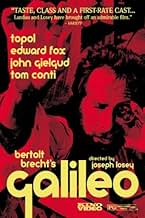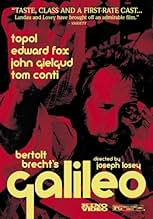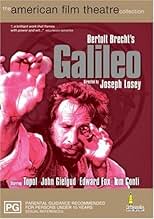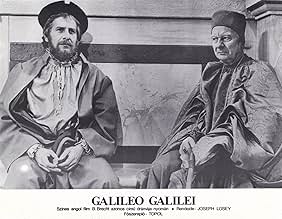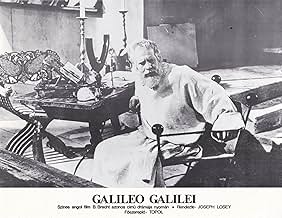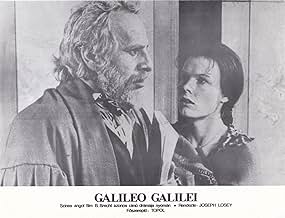Galileo Galilei, his telescopic discoveries, support of Copernican theory, conflict with Catholic Church leading to imprisonment, and influence on future scientists like Newton and Kepler.Galileo Galilei, his telescopic discoveries, support of Copernican theory, conflict with Catholic Church leading to imprisonment, and influence on future scientists like Newton and Kepler.Galileo Galilei, his telescopic discoveries, support of Copernican theory, conflict with Catholic Church leading to imprisonment, and influence on future scientists like Newton and Kepler.
Featured reviews
See the Plot Summary to know what this film is about.
Topol with his impatient manner of speech is somewhat insufferable as Galileo. But then, by all accounts, the real Galileo had a touch of arrogance in him and was not very likeable. This movie does not capture the horrors of pre-Industrial Europe, when religious authorities could inflict the most fiendish tortures on any victims they chose. This movie could have made a statement about religion run amok in the social milieu of the day. Instead, it is a bland film lacking dramatic tension. It is a movie adapted from a play and it shows. There is even a chorus of choirboys which is totally out of place. However, there are few bio-pics of great scientists, so this one is worth watching once.
Topol with his impatient manner of speech is somewhat insufferable as Galileo. But then, by all accounts, the real Galileo had a touch of arrogance in him and was not very likeable. This movie does not capture the horrors of pre-Industrial Europe, when religious authorities could inflict the most fiendish tortures on any victims they chose. This movie could have made a statement about religion run amok in the social milieu of the day. Instead, it is a bland film lacking dramatic tension. It is a movie adapted from a play and it shows. There is even a chorus of choirboys which is totally out of place. However, there are few bio-pics of great scientists, so this one is worth watching once.
This movie opens as a modern-day movie production filming from above the artificial stage lights. The story begins in 1609 Padua. Galileo Galilei (Topol) is a math teacher demonstrating the new Copernican System. Eventually, he comes into conflict with Cardinal Inquisitor (Edward Fox).
This is like a play or at least a staged film. There are those three singing boys introducing each section. After all, it is based on a play. The story unfolds episodically in nature. Some of this may be educational. The general story is familiar to me. This British film is filled with solid actors, but the tension isn't very high.
This is like a play or at least a staged film. There are those three singing boys introducing each section. After all, it is based on a play. The story unfolds episodically in nature. Some of this may be educational. The general story is familiar to me. This British film is filled with solid actors, but the tension isn't very high.
Galileo wheedles, cajoles, and instructs in this filmed stage version of Bertold Brecht's play, as translated by Charles Laughton.
Director Joseph Losey had directed its Broadway debut eight years earlier, and it's offered as a stage show, albeit with cinematographer Michael Rand offering a variety of angles and editor Reginald Beck trying his hardest.
It's one of those shows that is a hagiography, as Topol ages and looks weary, but maintains his childlike wonder. It's got some stage luminaries giving restrained performances -- except for John Gielgud as an elderly, ranting cardinal. The great charm of this production is, of course, seeing these fine stage actors in their natural medium. With Edward Fox, Margaret Leighton, Clive Revill and Tom Conti.
Director Joseph Losey had directed its Broadway debut eight years earlier, and it's offered as a stage show, albeit with cinematographer Michael Rand offering a variety of angles and editor Reginald Beck trying his hardest.
It's one of those shows that is a hagiography, as Topol ages and looks weary, but maintains his childlike wonder. It's got some stage luminaries giving restrained performances -- except for John Gielgud as an elderly, ranting cardinal. The great charm of this production is, of course, seeing these fine stage actors in their natural medium. With Edward Fox, Margaret Leighton, Clive Revill and Tom Conti.
Have for a long time had a lot of respect for Bertolt Brecht and 'Life of Galileo' is one of his most interesting works, especially from a thematic standpoint. Galileo, his life and observations (ahead of the time in his day) were fascinating and he is still deserving of being a giant influential figure in science and modern physics. Joseph Losey did some very good films, including his work with Harold Pinter and his 'Don Giovanni'. The cast sounded perfect on paper.
They weren't completely on film though, due to the actor who sounded like the perfect choice for their role strangely not working. 'Galileo' is well worth watching and is one despite some big drawbacks one of the better films of the inconsistent American Film Theatre series. As well as one of the more interesting entries, again from a thematic and content standpoint. It is no masterpiece, but there are a lot of good things here in 'Galileo' executed greatly. If one doesn't know of Galileo or know a lot about him, this film has enough to make them intrigued more.
'Galileo' is made with an appealing visual style, with grander sets than the usual ones for the American Film Theatre films and the photography is expansive enough without being overblown. Visually and dramatically, of all the play to film adaptations of the series 'Galileo' is one of the least stagebound. Losey directs with restraint but with confidence, he seemed an odd choice for director on paper as this is different territory for him but he does very well. The script is intelligent without being wordy.
A script too that expertly shows what made Galileo so fascinating, what made his findings so important in the development of science and the challenges he had to face. The story is intelligently done and gutsy on the whole and as said it makes one want to know more about the man. The themes of the play are handled well with some genuine tension in the conflict, and actually it was not so bad a thing that the political elements weren't largely emphasised (they're far from absent though) in my view. The Pope and Inquisitor scene is hair raising. 'Galileo' does stray from the facts, but through no fault of the film as Brecht never intended the play to be a biopic. The cast on the whole are very good, with some expertly controlled and authoritative acting.
With one big exception, as much as it pains me to say it. Can understand completely the criticisms for Topol's Galileo and do agree. Will say right now that there have been criticised performances in film history that to me are nowhere near as bad as cited. There was another performance in the American Film Theatre series that got a good deal of criticism, Lee Marvin in 'The Iceman Cometh'. Actually found him very admirable in his role, and he was against type whereas Galileo sounded tailor made for Topol. Who has the physique but sadly neither the heft or the subtlety, he brought those in 'Fiddler on the Roof' so what happened.
It doesn't help though that the film also misses the point of the character in the play, he is written and portrayed as too sympathetic (or that's how it came across, and this was the case more than once in the play's performance history) whereas Brecht intended for him to be a condemnation. Furthermore, while understanding what their role in the film was meant to be, kind of a Greek chorus explaining events and motivations, the choir did feel out of place and interrupted the action rather than moved it on. A few scenes went on for too long and felt like padding.
Summing up, a few big problems but a lot of strengths. Pretty good and in the better half of the series. 7/10.
They weren't completely on film though, due to the actor who sounded like the perfect choice for their role strangely not working. 'Galileo' is well worth watching and is one despite some big drawbacks one of the better films of the inconsistent American Film Theatre series. As well as one of the more interesting entries, again from a thematic and content standpoint. It is no masterpiece, but there are a lot of good things here in 'Galileo' executed greatly. If one doesn't know of Galileo or know a lot about him, this film has enough to make them intrigued more.
'Galileo' is made with an appealing visual style, with grander sets than the usual ones for the American Film Theatre films and the photography is expansive enough without being overblown. Visually and dramatically, of all the play to film adaptations of the series 'Galileo' is one of the least stagebound. Losey directs with restraint but with confidence, he seemed an odd choice for director on paper as this is different territory for him but he does very well. The script is intelligent without being wordy.
A script too that expertly shows what made Galileo so fascinating, what made his findings so important in the development of science and the challenges he had to face. The story is intelligently done and gutsy on the whole and as said it makes one want to know more about the man. The themes of the play are handled well with some genuine tension in the conflict, and actually it was not so bad a thing that the political elements weren't largely emphasised (they're far from absent though) in my view. The Pope and Inquisitor scene is hair raising. 'Galileo' does stray from the facts, but through no fault of the film as Brecht never intended the play to be a biopic. The cast on the whole are very good, with some expertly controlled and authoritative acting.
With one big exception, as much as it pains me to say it. Can understand completely the criticisms for Topol's Galileo and do agree. Will say right now that there have been criticised performances in film history that to me are nowhere near as bad as cited. There was another performance in the American Film Theatre series that got a good deal of criticism, Lee Marvin in 'The Iceman Cometh'. Actually found him very admirable in his role, and he was against type whereas Galileo sounded tailor made for Topol. Who has the physique but sadly neither the heft or the subtlety, he brought those in 'Fiddler on the Roof' so what happened.
It doesn't help though that the film also misses the point of the character in the play, he is written and portrayed as too sympathetic (or that's how it came across, and this was the case more than once in the play's performance history) whereas Brecht intended for him to be a condemnation. Furthermore, while understanding what their role in the film was meant to be, kind of a Greek chorus explaining events and motivations, the choir did feel out of place and interrupted the action rather than moved it on. A few scenes went on for too long and felt like padding.
Summing up, a few big problems but a lot of strengths. Pretty good and in the better half of the series. 7/10.
10pholmer
I wrote a previous comment on the film of Bertolt Brecht's play "Galileo" a few years ago. Since it's posted here I will try not to repeat myself. However, comments from other reviewers need addressing, especially since this film is finally out on DVD and more people may be interested in seeing it. Brecht's intent in this play, which he wrote and rewrote over a period of thirty years, was never intended to be a "biography" of the scientist. Brecht was a Marxist and he saw theatre as a means of propaganda, to jolt viewers out of their complacency, to shake up their way of thinking and their view of the world. How well he succeeded may be open to question, but it is important to understand his intent and point of view. To this end he incorporated what he called the "alienation effect" into his plays. He did not want viewers to get emotionally involved in the characters or experience a catharsis afterward. He wanted to address them directly and tell them that there were important ideas being presented and they should pay attention and think about them. He did not want his audience to be "entertained". If you ever see a production of his "Three-Penny Opera", for instance, the characters come out to the front of the stage and sing little lectures to the audience. The best known tune from this show, "Mack the Knife" is not the swinging jazzy Bobby Darin version, but is supposed to be sung in a grating, irritating voice. This is perhaps the most obvious example of Brecht's alienation effect. In "Galileo" this effect is less apparent, perhaps because this play leans toward the genre of realism more than most of his other plays. It is a rather straightforward, narrative story. In the film the choir boys sing between what would be different scenes in the play. In the play, the lyrics the boys sing are supposed to be on a sign or projected on a screen to bring the tell the audience the year, the place and the general theme of the upcoming scene. Why the producers or director chose to use the choir boys for this purpose, I cannot say and I do think the message get lost in their shrill soprano voices. But for Brecht, this was to be his alienation effect in "Galileo", a break in the action to remind the audience not to get involved in the storyline or the characters, but to pay attention to the ideas he is presenting. I'm pretty sure that the choir boys are in this film to do the same thing, to break up the narrative, to take the focus off the characters in the story, and to communicate the information about the next scene in a way unrelated to the rest of the play. If only they weren't so screechy! One last comment about Brecht & Galileo, the character. I mentioned that Brecht rewrote this play several times, He did this because he was unhappy that actors portrayed Galileo too sympathetically; Brecht wanted him to be a villain, a coward and a betrayer of humanity. Actors, however, were seduced by the slyness and humor of the character. Charles Laughton, who worked with Brecht to translate "Galileo" into English in the late 1940's was among those who couldn't avoid making Galileo likable. Brecht admired Laughton's theatre craftsmanship as they rehearsed the play, but was horrified to find the audience liked the character of Galileo & saw him as a hero instead of a villain. Brecht tried and tried to make Galileo unlikable but never succeeded. Years later, after he have returned to communist East Germany he again tried to make Galileo despicable rather than heroic. But even though he had his own Marxist theatre company in a Marxist country with Marxist actors, his audiences still loved Galileo. It may be the only time a character defeated the author who had created him.
Did you know
- TriviaJoseph Losey had also directed the original Broadway production of "Galileo," 28 years previously.
- GoofsAfter the crier announces Galileo Galilei's recantation, a chessboard is seen on the left side of the screen: all the pieces are upright. As Galileo enters, a new shot shows that one of the pieces has been toppled. In the next shot, all the pieces are again upright (1:57:50-1:58:10).
- Quotes
Andrea Sarti: [upon Galileo's recantation] Unhappy is the land that has no heroes.
Galileo Galilei: Incorrect. Unhappy is the land that *needs* a hero.
- ConnectionsFeatured in Zomergasten: Episode #23.1 (2010)
- How long is Galileo?Powered by Alexa
Details
- Release date
- Countries of origin
- Language
- Also known as
- Galileo Galilei
- Filming locations
- Production companies
- See more company credits at IMDbPro
- Runtime2 hours 25 minutes
- Sound mix
- Aspect ratio
- 1.85 : 1
Contribute to this page
Suggest an edit or add missing content



